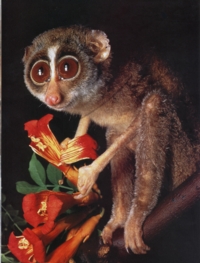Friday, January 15, 2010
Saturday, March 8, 2008
Wednesday, March 5, 2008
La-la-la-la-lovely Loris
Really, the first 30 seconds of this would do, but just look how precious its slow and deliberate moves are.
An oft-forgotten primate, the little loris is nevertheless a charming sunnuvagun. They're arboreal and nocturnal, which means they are a prosimian after my own heart. In their waking hours they like to play, wrestle, groom and hunt by the light of the moon. Lorises are primarily insectivores, but when they do eat other creatures they eat them whole, bones and all (extra protein!). They also mate but twice a year, hanging upside down from a branch; if no suitable branch can be found, no love shall be made.
 The slender loris is unique to the tropical rainforests of Southern India and Sri Lanka, and is believed to have magical and medinical powers. As described by Sir J. Emerson Tennent: "the singularly large and intense eyes of the loris have attracted the attention of the Singhalese, who capture the creature for the purpose of extracting them as charms and love-potions, and this they are said to effect by holding the little animal to the fire till the eyeballs burst."
The slender loris is unique to the tropical rainforests of Southern India and Sri Lanka, and is believed to have magical and medinical powers. As described by Sir J. Emerson Tennent: "the singularly large and intense eyes of the loris have attracted the attention of the Singhalese, who capture the creature for the purpose of extracting them as charms and love-potions, and this they are said to effect by holding the little animal to the fire till the eyeballs burst."The Tamil name for the red slender loris is Thavangu, or 'thin bodied'; charmingly, this is also the name given to deformed children and their emaciated ilk.
(All thanks be to Wikipedia & the Internets)
Monday, March 3, 2008
Bonobos never cease to blow my mind
Found at the primatology.net blog. I think it speaks for itself:
Coping with Winter

Some more fun facts (courtesy of Wikipedia):
- The Japanese Macaque lives in troops 20-100 individuals in size usually subdivided into matrilineal groups consisting of many females and several males. On average, females outnumber males by 3 to 1. The females have a rigid hierarchy with infants inheriting their mother's rank. The males tend to be transient within the troop.
- Research shows that "male macaque monkeys pay for sex by grooming females". Study found that "after a male grooms a female, the likelihood that she will engage in sexual activity with the male was about three times more than if the grooming had not occurred."
- Same-sex relations are frequent, rates however vary between troops. Females will form consortships characterized by affectionate, social and sexual activities. In some troops up to one quarter of the females will form such bonds, which will vary in duration from a few days to a few weeks. Often, strong and lasting friendships will result from such pairings. Males also have same-sex relations, typically with multiple partners of the same age. Affectionate and playful activities are associated with such relations.
- It is the only animal other than humans and raccoons that is known to wash its food before eating it.
- It has been found that the Japanese Macaque can develop different accents, like humans. It was found that macaques in areas separated by only a couple hundred miles can have very different pitches in their calls, their form of communication.
- It is often the subject of Buddhist myths, and is thought to be the inspiration behind the saying "see no evil, hear no evil, speak no evil."

The Dollar may be down, but the almighty Juice remains strong
"This is how gibbons act"
Damn fuckin' straight. Contrary to what one might assume, "delightfully cute" and "bad-ass motherfuckin' gangsta" are not mutually exclusive.



